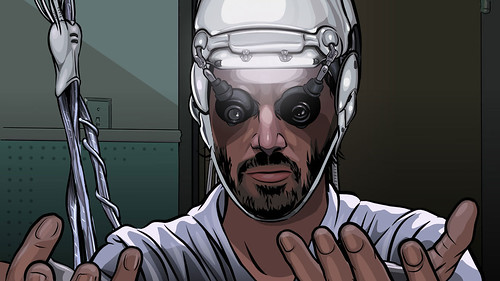Keanu Reeves is under there, somewhere
A Scanner Darkly, which just came to DVD this past week, may be the most unusual “
And not just any Dick novel either, but one of his most autobiographical and well-known, the tale of the drug-addicted cop of the near future. Further, Richard Linklater decided to make a film about heavy drug use with a cast that includes, in the key roles, Robert Downey, Jr., Woody Harrelson, Winona Ryder & Keanu Reeves (still taking the red pill, no less). Ryder’s father, who was an assistant of LSD advocate Timothy Leary (literally
I’ve noted before that short stories are often more susceptible to good film adaptations than are entire novels, because the richness of the latter always means a certain telescoping down of the project, while a short story often leaves the screenwriter & director with room to build in elements that ensure that the film works. Here, if memory serves (and it’s been decades since I’ve read the book, tho one of my sons may have a copy around here somewhere), it’s primarily the relationship between Arctor (Reeves) and his girlfriend Donna (Ryder), who is also, unbeknownst to him, his boss in the Orange County Police Department, that suffers here. But that’s a redaction on the order of those made, say, by Peter Jackson in translating LOTR to the screen – not impossible & regrettable mostly because Winona Ryder is better here than she has been in anything in years.
What we get instead are, first, an exceptionally paranoid narrative – right up there with David Cronenberg’s Videodrome & Alan Pakula’s Parallax View or anything by Bill Burroughs – in which the same organization that “cures” addicts of their craving for Substance D (a.k.a. Death) secretly produces it in vast quantities, “the flower of the future,” in its rural rehabilitation farms. Functionally, the corporation New Path is occupying virtually every position in the Substance D value chain: they’re even heavily enmeshed with the police. Indeed, it’s the old Burroughs junk as an economy equation all over again, but with something closer to crack than smack.
The second thing we get – and the best version of it since Trainspotting – is a deep inside view of the wrong side of drug use, the affect of addiction. A Scanner Darkly is almost a love song to methamphetamine abuse, with its paranoia, hallucinations, verbal tics, random gun use, hysteria, outright psychosis & disconnection with the body. Everyone has their own personal way of relating to addiction: Donna doesn’t like to be touched; Freck (Rory Cochrane) is isolated & suicidal, hallucinating bugs emerging literally from the pores of his body; Barris (Downey) verbally weaves loopy conspiracy theories around his constant paranoia; Luckman (Harrelson) isn’t in touch with his own paranoia until it suddenly bursts through his loopy persona & he dissolves in hysteria, which does more than once; Arctor (Reeves) can barely imagine doing anything at all. But when asked, everybody has the same answer to the question about their drug use: How much are you doing? Not that much. The interactions of the druggies represent some of the best ensemble theater I’ve ever seen in a picture.
The premise of the narrative that operates through this cast is simple. In a world of near total surveillance, where 20 percent of population is addicted to Substance D, including most of the cops dedicated to the arrest & prosecution of dealers & users, nobody can trust anyone. One way around this is that cops use not just pseudonyms, but dress in constantly changing holosuits, ongoing collages of images that make it impossible to settle on one or two, giving the individual a sense of being a “vague blur,” halfway between a David Salle painting & a TV constantly flipping channels before you can quite identify what you’re seeing. The cops do all this with one another at the station, or when representing the department out in the community, so only a few superiors ever get to know who their fellow officers might be. Arctor, a cop using the pseudonym Agent Fred, as well as an addict, is the given the job of investigating and arresting himself. Why he’s investigating himself & what it will lead him to find won’t become clear until the final moments of the picture.
What pulls these two domains together – the aimless & disjointed one of Death heads riffing on their fears, the twisty little noir plot an efficient engine of narrative motion – is the rotoscoping process that transforms live action into an instance of cartoon. One of my sons saw it as integral to the film’s message – they’re there but they don’t seem real. Not unlike Arctor’s wife & two kids, a world of family values that he rues turning his back on, but which may never have existed. Rotoscoping, which has been making its way into commercials over the past year, requires 500 hours of labor for each minute of film. It’s really essential for the special effects – especially the holosuits – but it’s here more for what it does for the story.
Linklater, whose last four films include the terrific little romance, Before Sunset, Bad News Bears, Fast Food Nation & this, is – along with Steven Soderbergh – one of two






